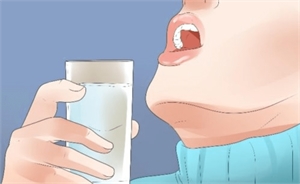Rinse your mouth every two to three hours for the first few days after surgery, then use it three to four times a day thereafter. After hours, gently rinse your mouth with warm salt water (one teaspoon of salt in a glass of warm water ) 3-times per day, always after meals. Be very careful not to dislodge any blood clot in the tooth socket.

Sometimes, rinsing your nasal passages with a salt water solution can be helpful. This is known as nasal irrigation or nasal douching. Rinsing your nasal passages helps wash away any excess mucus or irritants inside your nose, which can reduce inflammation and relieve your symptoms. Hold the salt water in the mouth for one minute and gently swish the solution around and then spit out.
Repeat mouthwashes 3-times a day and after you have eaten to make sure your mouth remains clean. Do not use any other mouthwashes after the operation unless instructed to by the ward nurses or oral surgery doctors. Start by bringing ounces of warm water to a rolling boil, about minutes. When cooled accordingly, place the salt in the water while gently stirring until the salt has been completely dissolved.

Making the salt water correctly is important to ensure it gives the maximum benefit. A basic salt water mouth rinse can be created by allowing a small amount of salt to dissolve in warm water. As little as half a teaspoon of salt in a full sized dinner glass can be enough to kill off bacteria in the mouth. However, it is important to create a mouthwash that is not too salty for you to manage.
Drinking too much salt water can also have health risks, such as calcium deficiency and high blood pressure. Gargling at least twice a day is recommended. A warm rinse with salt water will clean your tongue and may help relieve the pain of a sore tongue. You can safely gargle many more times than that, too.

Add one tablespoon of salt to a glass of warm water and stir to dissolve. This can happen for a number of reason, such as eating sharp foods, like chips, or brushing your gums too aggressively. If your gums regularly bleed after you floss or brush your teeth, you may be experiencing gum disease (gingivitis).
This should not be started until eight hours after your treatment. It should be done at least four times a day for four to five days. You should not rinse your mouth out on the day of surgery as this may wash out the blood clot and delay healing.
Soothe inflammation and prevent infection from returning. For the above reason, salt water gargles can help alleviate throat inflammation caused by seasonal allergies, colds, and sinus infections. But the simple mixture can also prevent an infection from striking twice. Salt water mouthwash rinses are an excellent short term treatment when you have wounds in the mouth, for instance, when you’ve had teeth removed. The reason they are so good is that the salt is not only a natural disinfectant, but it also removes any swelling from the tissues.
Evidence-based information on salt water gargle from hundreds of trustworthy sources for health and social care. The salt water rinse is an amazing remedy for the treatment of bleeding and swollen gums. It helps in getting rid of any kind of cavities or even infection that could be the reason behind the same. Swishing the entire salt water throughout the mouth reaches the crevices of the mouth and helps get rid of all the signs and symptoms that accompany it.
A teaspoon of salt in a glass of warm water gently rinsed around the socket twice a day can help to clean and heal the area. Keep this up for at least a week or for as long as your dentist tells you.
No comments:
Post a Comment
Note: Only a member of this blog may post a comment.